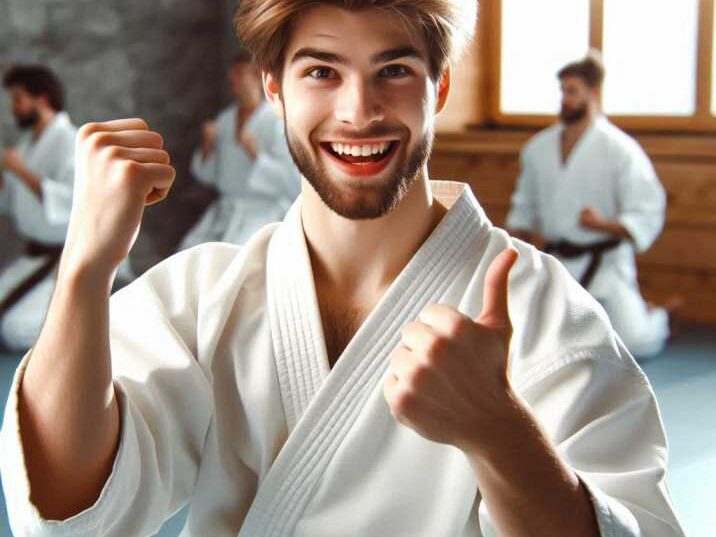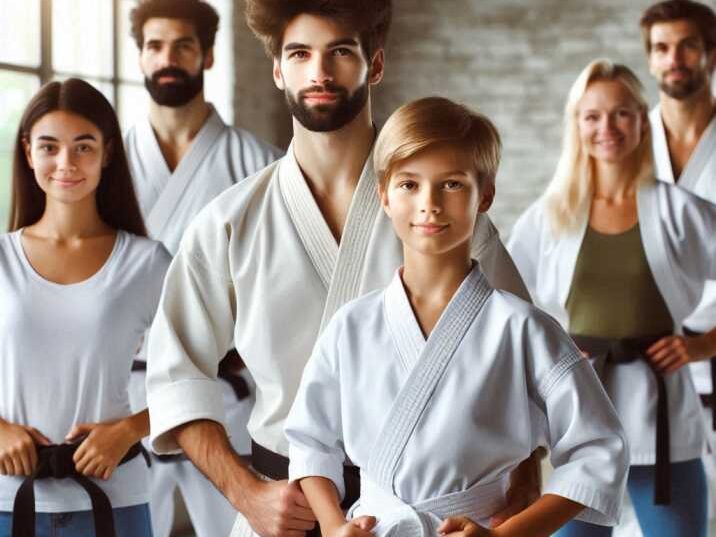Introduction
Table of Contents
Thinking about starting karate at 18? You’re not alone! Many people wonder if they can begin martial arts training later in life and still see significant benefits. Whether you’re looking to improve your fitness, learn self-defense, or simply find a new hobby, karate offers numerous advantages regardless of when you start. In this comprehensive guide, we’ll explore why starting karate at 18 is a fantastic idea, what to expect as a beginner, and tips to make the most of your training. By the end, you’ll be inspired and informed to take your first steps into the dojo!

Why Starting Karate at 18 is a Great Idea
Starting karate at 18 offers several compelling benefits that can positively impact various aspects of your life. Here’s a deeper look at why this martial art is a fantastic choice at this age:
1. Physical Fitness Karate provides a comprehensive workout that improves your overall physical fitness. The practice includes a range of movements—such as kicks, punches, and stances—that enhance strength, flexibility, and endurance. Regular training helps build muscle, increase cardiovascular health, and improve coordination. This makes karate not just a means of self-defense, but also a way to stay active and healthy.
2. Mental Discipline Karate is more than just a physical activity; it’s also a mental challenge. The practice requires intense focus and perseverance, helping you develop mental toughness. As you learn new techniques and forms, you must concentrate and remain disciplined, which translates to improved self-control and problem-solving skills. This mental discipline can benefit other areas of your life, such as academics or career goals.
3. Self-Defense One of the key advantages of karate is learning practical self-defense skills. Through karate, you gain techniques to protect yourself in various situations, which boosts your confidence and personal safety. This aspect of karate not only equips you with the ability to defend yourself but also instills a sense of security and empowerment.
4. Social Opportunities Joining a karate class introduces you to a community of people who share your interests and goals. This creates opportunities to form new friendships and build a supportive social network. The dojo becomes a place where you can connect with others, exchange experiences, and be part of a group with similar values and pursuits.
5. Personal Growth Karate promotes personal growth by encouraging you to set and achieve goals. Whether it’s mastering a new technique, earning a belt, or improving your physical fitness, karate challenges you to push your limits and achieve milestones. This sense of accomplishment and progress fosters personal development, helping you build confidence and resilience both inside and outside the dojo.
What to Expect When Starting Karate at 18
Starting karate at 18 can be a rewarding experience, but it’s helpful to know what to expect as you embark on this new journey. Here’s a breakdown of what you might encounter:
1. Training Intensity Karate training varies in intensity. Beginners often start with basic techniques and gradually progress to more advanced forms. Initial classes may focus on foundational skills, while more advanced sessions will incorporate complex techniques and sparring. While karate is rigorous, you will be able to advance at a pace that suits you. The key is to remain consistent and dedicated, adjusting the intensity of your practice as you become more comfortable and skilled.
2. Physical Demands Karate involves a range of physical movements, including kicks, punches, blocks, and stances. These movements can be physically demanding, especially when you’re just starting out. It’s normal to feel sore after classes, as your muscles adjust to new exercises and routines. However, this soreness is a natural part of the process. With regular practice, you’ll notice improvements in your strength, flexibility, and overall fitness. Your body will adapt, and the physical demands will become more manageable over time.
3. Learning Curve As a beginner, you’ll start with fundamental techniques and gradually advance to more intricate forms and applications. The learning curve in karate can be steep initially, but it’s important to be patient with yourself. Mastery of karate techniques requires time and practice. Progress may seem slow at first, but with persistence, you will gradually improve and gain proficiency. Celebrate small victories and milestones to stay motivated.
4. Instructor Expectations Karate instructors understand that students come with varying levels of experience and fitness. They are trained to cater to the needs of each student, providing guidance and support based on individual abilities. It’s important to communicate openly with your instructor about your personal goals, any concerns you might have, and any physical limitations or injuries. This will help them tailor their teaching approach to best support your progress and ensure a positive learning experience.
Tips for Starting Karate at 18
Starting karate at 18 can be an exciting and fulfilling endeavor. To help you get the most out of your training, here are some practical tips explained in detail:
1. Find a Reputable Dojo Choosing the right dojo is crucial for a successful karate journey. Look for a dojo that has experienced instructors and a positive, welcoming training environment. Visiting classes and talking to current students can provide insight into the dojo’s atmosphere and teaching style. Ensure the dojo’s approach aligns with your personal goals, whether you’re interested in fitness, self-defense, or competition. A good dojo will support your learning and help you stay motivated.
2. Set Realistic Goals Setting clear, achievable goals is essential for maintaining motivation and tracking your progress. Start by defining what you hope to achieve with karate, such as improving your fitness, mastering specific techniques, or earning a particular belt. Break these goals into smaller, manageable steps to keep yourself focused and motivated. Regularly review and adjust your goals as you progress to ensure they remain challenging yet attainable.
3. Stay Consistent Consistency is key to making progress in karate. Commit to attending classes regularly and practice at home to reinforce what you’ve learned. Regular practice helps build muscle memory, improve technique, and increase overall fitness. Skipping classes or inconsistent practice can slow your progress and make it harder to achieve your goals. Establish a routine that fits your schedule and stick to it.
4. Focus on Technique In karate, perfecting your technique is more important than the number of techniques you learn. Quality over quantity ensures that you develop a strong foundation and avoid bad habits. Pay attention to the details of each movement, such as form, precision, and execution. Starting slowly and focusing on technique helps you build a solid skill set that will benefit you in more advanced training.
5. Listen to Your Body Karate can be physically demanding, and it’s important to listen to your body to avoid injury and burnout. If you experience pain or discomfort, take it seriously and give yourself time to rest and recover. Pushing through pain can lead to more serious injuries and setbacks. Incorporate proper warm-ups, cool-downs, and stretching into your routine to help prevent injuries and improve flexibility. Prioritizing rest and recovery ensures long-term success and helps you stay healthy and motivated.
Benefits of Starting Karate at 18
Starting karate at 18 offers a wealth of advantages that can enhance both your physical and mental well-being. Here’s a closer look at the benefits you can expect:
1. Improved Fitness Karate provides a comprehensive workout that engages various muscle groups and systems in your body. Through dynamic movements like kicks, punches, and stances, you enhance cardiovascular health, build strength, and increase flexibility. Regular practice improves overall physical fitness, helping you develop better endurance and muscle tone.
2. Enhanced Coordination Karate requires precise movements and techniques that improve hand-eye coordination, balance, and motor skills. As you learn to execute complex patterns and perform various drills, your coordination will naturally improve. This enhanced motor control can benefit other activities and daily tasks, making you more adept and agile.
3. Increased Confidence Achieving milestones and mastering new techniques in karate can significantly boost your self-esteem. Each new skill you acquire and each challenge you overcome reinforces a sense of accomplishment. This increased confidence extends beyond the dojo, positively affecting various aspects of your life, including personal relationships and professional endeavors.
4. Stress Relief Karate is not only a physical activity but also has meditative aspects that promote mental well-being. The focus required during practice helps you clear your mind and reduce stress. The physical exertion of training releases endorphins, which are natural stress relievers. Additionally, the structured environment of karate classes provides an outlet for pent-up tension and anxiety.
5. Lifelong Skills Karate instills valuable life skills that are beneficial both inside and outside the dojo. Perseverance is developed through the consistent practice required to improve and advance in ranks. Respect for instructors, fellow students, and the discipline itself fosters positive interpersonal relationships. Self-discipline, a core component of karate, helps you set and achieve personal goals, making it easier to tackle challenges in various areas of life.

Table of Information about Starting karate at 18:
| Aspect | Details |
|---|---|
| Starting Age | 18 and above |
| Benefits | Fitness, discipline, self-defense, social connections |
| Training Intensity | Varies from basics to advanced techniques |
| Physical Demands | Involves kicks, punches; expect initial soreness |
| Learning Curve | Begins with basics, advances over time |
| Goals | Fitness, technique mastery, belt progression |
| Time for Black Belt | 3 to 5 years |
| Attire | Comfortable clothing; gi provided later |
Conclusion
Starting karate at 18 is a fantastic choice that offers numerous benefits, from improved fitness to increased confidence. It’s never too late to begin; karate welcomes learners of all ages. Embrace the journey with dedication and patience, and you’ll find that karate can positively impact many aspects of your life. So, step into the dojo and start your exciting new adventure today!
FAQs
1. Is it too late to start karate at 18?
No, it’s not too late! Many people begin karate in their late teens or even later. Starting karate at 18 is a great age to begin training and enjoy all the benefits karate has to offer.
2. Will I be able to keep up with younger students in karate classes?
Yes, many karate classes have students of all ages and skill levels. Instructors will tailor their teaching to accommodate everyone, and you’ll progress at your own pace.
3. How long does it take to earn a black belt in karate?
The time it takes to earn a black belt varies depending on the style of karate and the individual’s dedication. On average, it can take 3 to 5 years of consistent training to achieve a black belt.
4. Can I start karate if I have no prior martial arts experience?
Absolutely! Karate is suitable for beginners with no prior martial arts experience. Classes are designed to accommodate students of all skill levels.
5. What should I wear to my first karate class?
Wear comfortable, athletic clothing and be prepared to practice barefoot. Most dojos will provide a uniform (gi) once you begin your training.


